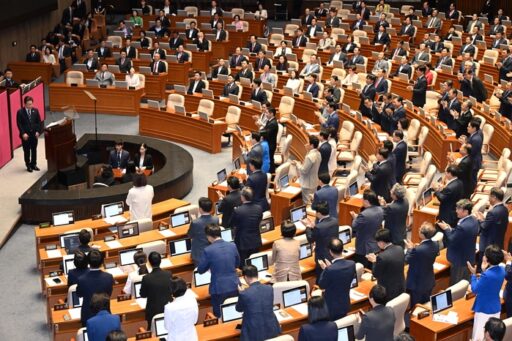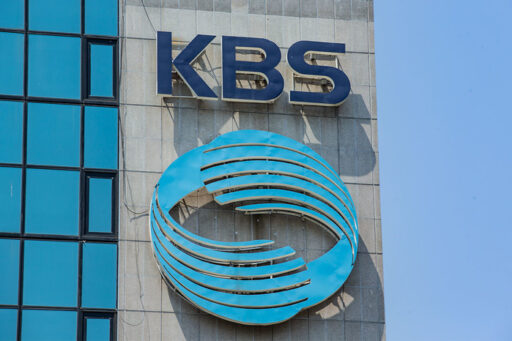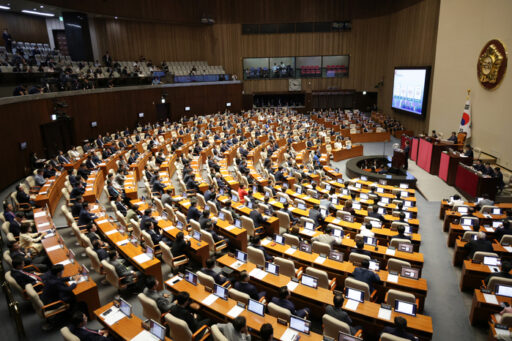Imminent Major Changes in the Governance Structure of Public Broadcasting
The amendment to the Broadcasting Act, which was discarded by the Yoon Suk-yeol government exercising its right to demand reexamination (veto power), passed the National Assembly plenary session on the 5th.
Now, only the presidential promulgation procedure remains, and if this law is enacted, significant changes are expected in the governance structure of public broadcasting.
The Democratic Party of Korea forcibly concluded the filibuster by the People Power Party, which began at 4:01 PM the previous day, after 24 hours and 12 minutes.

The Broadcasting Act was put to a vote immediately after the end of the filibuster, resulting in 178 votes in favor and 2 against out of 180 present. In protest, the People Power Party exited the plenary session.
The recently passed amendment to the Broadcasting Act is a key legislative measure related to media reform among the three major reforms promoted by the Democratic Party, including "prosecutorial, media, and judicial reform." Its main focus is to comprehensively overhaul the governance structure of public broadcasting.
Key Legislation Related to Media Reform
Significant Changes in the Appointment Process for Public Broadcasting Board and President
Once the law is enacted, the boards of public broadcasting organizations such as KBS will be newly constituted within three months with members recommended by the National Assembly negotiating group, relevant academic societies, and lawyer organizations. Specifically, the number of board members for KBS will increase from the current 11 to 15, and the entities that recommend board members will also change.
The negotiating group will recommend 6 members, the viewer committee 2 members, KBS employees 3 members, relevant academic societies 2 members, and lawyer organizations 2 members.

Although there is a recommendation and nomination procedure by the Korea Communications Commission (KCC), it is expected that the recommended candidates will be virtually nominated and appointed as board members since the number of KBS board member positions and the number of recommendations from the recommending institutions is identical at 15.
Notably, there is a provision that if the president does not appoint a recommended candidate within 14 days despite the absence of disqualifying factors, that candidate is automatically considered appointed.
To appoint the presidents of public broadcasters such as KBS, MBC, and EBS, a "Presidential Candidates National Recommendation Committee" made up of over 100 citizens will be established.
This committee will be composed of individuals representing the gender, age, and regional distribution of the entire population, and the committee’s composition may also be entrusted to a polling agency.
Changes in News Specialty Channels and Programming Committees

News specialty channels such as 연합뉴스TV and YTN must establish and operate a president recommendation committee through an agreement with the representative labor union.
For news channels, matters regarding the composition of the recommendation committee will not be explicitly stated in the Broadcasting Act; instead, they are required to outline issues such as the number of members, composition methods, and the candidate recommendation period in their articles of incorporation. Matters outside the provisions of the articles of incorporation are to be set as operational rules through agreement with the representative labor union.
All terrestrial, comprehensive programming, and news specialty channels must establish programming committees composed of members recommended in equal proportions by both the company and its employees.
This programming committee will review and deliberate on programming regulations and play a role in recommending the head of the programming department.
The amended Broadcasting Act is expected to take effect immediately upon promulgation, and as a result, there is a high likelihood that most of the current presidents and board members will be replaced within the year.
During the August extraordinary session of the National Assembly, amendments to the Broadcasting Culture Promotion Act and the Korea Educational Broadcasting System Act are also expected to be introduced. These bills stipulate that the board members of the Broadcasting Culture Promotion Agency, which is the major shareholder of MBC, and EBS be composed of 13 members each, recommended by the National Assembly negotiating groups and related institutions.

Image source: News1, photo = Insight


